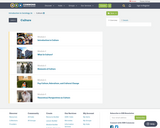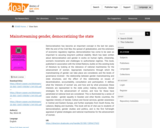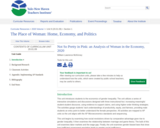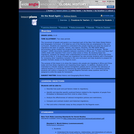
- Subject:
- Social Science
- Sociology
- Material Type:
- Unit of Study
- Provider:
- Rice University
- Provider Set:
- OpenStax College


Discuss the roles of both high culture and pop culture within societyDifferentiate between subculture and countercultureExplain the role of innovation, invention, and discovery in cultureUnderstand the role of cultural lag and globalization in cultural change

This course explores perspectives in the policy process - agenda setting, problem definition, framing the terms of debate, formulation and analysis of options, implementation and evaluation of policy outcomes using frameworks including economics and markets, law, and business and management. Methods include cost/benefit analysis, probabilistic risk assessment, and system dynamics. Exercises include developing skills to work on the interface between technology and societal issues; simulation exercises; case studies; and group projects that illustrate issues involving multiple stakeholders with different value structures, high levels of uncertainty, multiple levels of complexity; and value trade-offs that are characteristic of engineering systems. Emphasis on negotiation, team building and group dynamics, and management of multiple actors and leadership.

This course is an introduction to diverse musical traditions of the world. Music from a wide range of geographical areas is studied in terms of structure, performance practice, social use, aesthetics, and cross-cultural contact. Course work includes hands-on music making, live demonstrations by guest artists, and ethnographic research projects.

This course explores the ways that music is both shaped by and gives shape to the cultural settings in which it is performed, through studying selected musical traditions from around the world. Specific case studies will be examined closely through listening, analysis, and hands-on instruction. The syllabus centers around weekly listening assignments and readings from a textbook with CDs, supplemented by hands-on workshops, lecture/demonstrations and concerts by master musicians from around the world.

This course examines Israeli identity using a broad array of materials, including popular music, film, documentaries, and art, in addition to academic historical writings. Topics include Israel’s political system and society, ethnic relations, settlement projects, and the Arab minorities in the Jewish state. Students also discuss whether there is a unique Israeli culture and the struggle for Israel’s identity.
Preference is given to students in the MISTI MIT-Israel program.

The primary purpose of this seminar is to enable students to craft approaches to so-called “First World”/ “Third World” city comparisons that are theoretically sophisticated, methodologically rigorous, contextually grounded, and significantly beneficial. Since there exists very little literature and very few projects which compare “First World” and “Third World” cities in a sophisticated and genuinely useful manner, the seminar is structured around a series of readings, case studies, and discussions to assist students in becoming mindful of the potential and pitfalls of comparative analysis, the types of data, the methods of analysis, and the urban issues or sectors which may benefit the most from such approaches. The course is designed to be interdisciplinary and interactive, and is geared towards masters and doctoral students.

Democratization has become an important concept in the last ten years. With the end of the Cold War, the spread of globalization, and the extension of economic regulatory regimes, democratization has come to be seen as important to securing long-term political stability. Much has been written about democratization and gender in works on human rights, citizenship, women's movements and challenges to authoritarian regimes. This book, published in association with the United Nations, builds on this existing body of literature by looking at the relevance of national machineries for the advancement of women. Appropriate mechanisms through which the mainstreaming of gender can take place are considered, and the levels of governance involved - the relationship between gender mainstreaming and state structures, and the effect of this relationship on issues of decentralization, accountability, consultation and participation. It defines what the 'interests of women' are, and how and by what processes these interests are represented to the state policy making structures. Global strategies for the advancement of women, and how far these have penetrated at national level are considered. This is illuminated by a series of case studies - gender equality in Sweden and other Nordic countries, the Ugandan ministry of Gender, Culture and Social services, gender awareness in Central and Eastern Europe, and further examples from South Korea, the Lebanon, Beijing and Australia. This book will be of vital use to students of democratization, gender studies and politics, and is the first full-length appraisal of global strategies and national machineries for the advancement of women.

Everyday we are bombarded with the word “global” and encouraged to see globalization as the quintessential transformation of our age. But what exactly does “globalization” mean? How is it affecting the lives of people around the world, not only in economic, but social and cultural terms? How do contemporary changes compare with those from other historical periods? Are such changes positive, negative or simply inevitable? And, finally, how does the concept of the “global” itself shape our perceptions in ways that both help us understand the contemporary world and potentially distort it? This course begins by offering a brief overview of historical “world systems,” including those centered in Asia as well as Europe. It explores the nature of contemporary transformations, including those in economics, media & information technologies, population flows, and consumer habits, not through abstractions but by focusing on the daily lives of people in various parts of the world. This course considers such topics as the day-to-day impact of computers in Silicon Valley and among Tibetan refugees; the dilemmas of factory workers in the US and rural Java; the attractions of Bombay cinema in Nigeria, the making of rap music in Japan, and the cultural complexities of immigrant life in France. This course seeks not only to understand the various forms globalization takes, but to understand its very different impacts world-wide.

This instance of “Media, Education, and the Marketplace” focuses on the rise of information and communications technologies (ICTs) during the age of globalization, specifically examining its effect and potential in developing nations across the world. In particular, the class will focus on the following three components:
“Media” – ICTs, specifically the dramatic rise in use of the Internet over the past twenty years, have “globalized” the world and created opportunities where very few have been available in the past. We are entering a phase where an individual can significantly improve his or her own economical, political, and social circumstances with just a computer and Internet connection. This course investigate these profound developments through current research and case studies.
“Education” – With projects such as MIT’s OpenCourseWare, the major players in the world are beginning to understand the true power of ICTs in development. Throughout this class, we examine projects that harness the benefits of ICTs to create positive social change around the world.
“Marketplace” – The focus is on the developing regions of the world. Specifically, the term “digital divide” is tossed around in everyday language, but what does it really mean? Is there an international digital divide, a national digital divide, or both? Should we try to bridge this divide, and how have past attempts succeeded and (for the most part) failed? Why? These are all questions that are asked throughout this course.
This course has a very unique pedagogy, which is discussed in more detail in the syllabus section.

This course explores the international trade in television text, considering the ways in which ‘foreign’ programs find places within ‘domestic’ schedules. Looking at the life television texts maintain outside of their home market, this course examines questions of globalization and national cultures of production and reception. Students will be introduced to a range of positions about the nature of international textual trade, including economic arguments about the structuring of international markets and ethnographic studies about the role imported content plays in the formation of hybrid national identities. Students will be encouraged to consider the role American content is made to play in non-American markets.

This class provides an introduction to modern art and theories of modernism and postmodernism. It focuses on the way artists use the tension between fine art and mass culture to mobilize a critique of both. We will examine objects of visual art, including painting, sculpture, architecture, photography, prints, performance and video. These objects will be viewed in their interaction with advertising, caricature, comics, graffiti, television, fashion, folk art, and “primitive” art.

The goal of this course is to offer a general introduction to 20th and 21st century literature and cultural production about Modern Mexico. Emphasis will be placed on the way intellectuals and artists have presented the changes in Mexico City’s urban life, and how these representations question themes and trends in national identity, state control, globalization, and immigration.

As globalization and technological advances bring us hurtling towards a new integrated future, Ian Goldin warns that not all people may benefit equally. But, he says, if we can recognize this danger, we might yet realize the possibility of improved life for everyone. Ian Goldin is director of the 21st Century School at Oxford. Through the school's program of research, collaboration and education, he's powering new, cross-disciplinary thinking about global problems from the near and far future. A quiz, thought provoking question, and links for further study are provided to create a lesson around the 7-minute video. Educators may use the platform to easily "Flip" or create their own lesson for use with their students of any age or level.

This unit introduces students to the economics of gender inequality. The unit utilizes a series of interactive simulations and discussions designed with three instructional foci: increasing meaningful student-student discourse, using evidence to support claims, and using higher-order thinking strategies. The activities gauge students’ tacit understandings of productivity, equity, and fairness, providing male students an entry point to better understand the female perspective. All activities are mapped to AP units so the unit aligns with the AP Microeconomics standards and sequencing.
This unit begins by examining how social revolutions driven by comparative advantage gave rise to gender inequality. It then examines the relationship between marriage and game theory. The bulk of this unit examines labor markets and the wage gap. Finally, the unit examines gender-biased laws that show how inefficient government regulation leads to greater social inefficiency.
Activities are designed for an 80-minute class with approximately 25 students. Lessons call for students to sit in small groups to facilitate discussion and collaboration. Students will need access to a computer and the internet to complete multiple activities.
As a word of warning, the activities are meant to help students learn to empathize with the disparity caused by gender inequality and may make some students uncomfortable. One activity is designed so students believe their grade is determined in a way that mirrors the wage gap. It may be helpful to give parents a heads up before completing the activity to let them know the experiment will not actually affect their grades disproportionally.
The essential questions of the unit are
1. What social inefficiencies naturally arise in American product and labor markets?
2. What role does the government play in correcting market failures?
3. How can society and the government change current legislature and policy to promote gender equality in the product and labor markets?

The movement of people and goods is an important part of the New York State Global History and Geography Curriculum. It is listed as one of the themes that are emphasized in the core curriculum. Students are expected to understand why people migrate and what the impact of migrations has been on people, nations, and regions. Recently, the PBS WIDE ANGLE documentary series created two programs that relate to the movement of people. 'Border Jumpers' (2005) documents migration between countries in Africa, and 'To Have and Have Not' (2002) deals with migration from rural to urban areas in China. By studying these two migrations, students can deepen their understanding of events and trends in Africa and China since World War II. A study of these two migrations can also provide students with a framework for reviewing other migrations included in the core curriculum and help students to prepare for possible thematic essays on the Regents exam. The purpose of this lesson is to show the reasons why people are migrating in Africa and China today and how these migrations are impacting those regions. In addition, students will be motivated to critically analyze national immigration policies and to consider the relevance of national borders in a world that is experiencing rapid globalization. As a culminating activity, students will outline a response for a sample Regents thematic essay question and will be assigned to write the essay for homework.

15.769 Operations Strategy provides a unifying framework for analyzing strategic issues in manufacturing and service operations. Students analyze the relationships between manufacturing and service companies and their suppliers, customers, and competitors. The course covers strategic decisions in technology, facilities, vertical integration, human resources, and other areas, and also explores means of competition such as cost, quality, and innovativeness.

This course is an introduction to modern Indian culture and society through films, documentaries, short stories, novels, poems, and journalistic writing. The principal focus is on the study of major cultural developments and social debates in the last sixty five years of history through the reading of literature and viewing of film clips. The focus will be on the transformations of gender and class issues, representation of nationhood, the idea of regional identities and the place of the city in individual and communal lives. The cultural and historical background will be provided in class lectures. The idea is to explore the “other Indias” that lurk behind our constructed notion of a homogeneous national culture.

This is a graduate seminar for students who already have some familiarity with issues in political economy and/or European politics. The objective is to examine the ways in which changes in the international economy and the regimes that regulate it interact with domestic politics, policy-making, and the institutional structures of the political economy in industrialized democracies.

Discuss the roles of both high culture and pop culture within societyDifferentiate between subculture and countercultureExplain the role of innovation, invention, and discovery in cultureUnderstand the role of cultural lag and globalization in cultural change